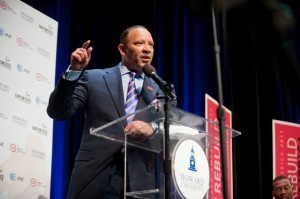New Orleans is host to N.U.L.
23rd July 2012 · 0 Comments
By Mason Harrison
Contributing Writer
easy loan limited When members of the National Urban League kick off the group’s annual conference in New Orleans this week, the imagery of having the country’s first Black president deliver the organization’s opening address in a convention hall named for the city’s first Black mayor has not been lost on some. 
For 100 years, the Urban League has sought to create many firsts for Blacks shut out of the national economy and public policy circles at meaningful levels. For local Urban Leaguers, orchestrating this year’s conference, and all that it means, has been “absolutely incredible,” according to New Orleans chapter president, Nolan Rollins.
“It’s like getting and winning the Super Bowl all at the same time,” Rollins says, describing the excitement he and his colleagues feel as the national conference approaches. “The last time the conference was here was in 1996, but the president wasn’t coming then and the president of our organization wasn’t the former mayor of New Orleans.”
But through all of the exhilaration, the Urban League plans to address very serious issues facing Black America, including the high rate of unemployment and access to vital services like health care, education and the right to vote. The local chapter will also roll out its report on the state of Black New Orleans, detailing the challenges to achieving political and economic success in the area.
White House officials would not offer a glimpse into what the president will say before the Urban League, but noted there will be “major announcements” surrounding the event. Urban League president and former New Orleans mayor, Marc Morial, hopes the president will “talk about and defend his record” in light of short term loans no credit check no paperwork the political beating Obama has taken as he seeks reelection.
Locally, the Urban League has a long record – dating back 70 years – of pushing for advancements in the city’s Black communities. Rollins is spearheading what the group calls its “three centers of excellence,” which focus on youth development, training and education; early childhood scholastics; and economic, community and business development.
Under the group’s youth development tier, Rollins says his organization has worked with several grade- and high-schoolers to improve academic performance, an effort that resulted in every student enrolled in the Urban League program receiving collegiate scholarships. What is more impressive, Rollins notes, is that “these weren’t all A students,” adding, “Some of these kids, when we started working with them, couldn’t even read.”
The group has also secured funding for a Head Start center in the Lower Ninth Ward, a project, Rollins says, is all about putting services in the heart of where they are needed and aiding the underserved. The new facility, Rollins states, lies at the intersection of two avenues: Agriculture and industry. “The Urban League helped Blacks migrate from an agriculture economy to one based on industry; and now with the advent of computers we will assist in moving from industry to technology.”
The local chapter also connects the unemployed to job postings and assists firms with redirecting laid-off workers to available services and new employment opportunities. Rollins calls this approach the “opportunity and deficit model,” where the group pairs those looking for work with available opportunities and works to eliminate deficits in employment created by downsizing by redirecting the newly unemployed. Matching would-be entrepreneurs with start-up capital is also american general installment loans for bad credit a prong of the group’s economic development efforts.
Nationally, the Urban League is engaged in a decades-long quest to win what Morial calls the “empowerment movement” to secure improved health, academic and financial outcomes for minorities. The organization has set 2025 as the target to making serious advances in this arena.
“I hope that by 2025 New Orleans will be a city with stable communities from the Lower Nine to Uptown, from the Garden District to the Bywater. What I mean by stable communities is having neighborhoods where the community systems are dependable and transparent.”
Today, the nationwide Urban League headquarters sits squarely on Wall Street, a thoroughfare built in part by slave labor and the epicenter of the mortgage scams that destroyed home ownership for many Blacks.
But when asked if organizations like the Urban League will be needed in a future imagined by the group in 2025, Rollins responded with the following: “Our mission is to serve the underserved. Being underserved is not a color; it is a space and place in time. Changes in economics and public policy will always create those who are underserved and our mission will be to continue to help them.”
The discussion now, Rollins says, is no longer about being able “to sit at the front of the bus” or “who gets to eat at what lunch counter.” “The discussion,” he believes, “is about how do we get people to own bus companies and how do we increase restaurant ownership.”
This article originally published in the July 23, 2012 print edition of The Louisiana Weekly newspaper.



